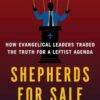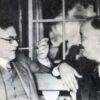Category: Evangelical Calvinist
Writings from the blog: Athanasian Reformed (aka The Evangelical Calvinist). Senior Reformed scholars present a coherent and impassioned articulation of Calvinism for today’s world.
Dark Heart-Inscrutable Sin Contra Natural Theology-Law
“The heart is more deceitful than all else And is desperately sick; Who can understand it? “I, the Lord, search the heart, I test the mind, Even to give to each man according to his ways, According to the results of his deeds. –Jeremiah 17:9–10 This is going to be a very brief screed on the inscrutable reality of sin and evil. As the prophet Jeremiah speaks for Yahweh, or as Yahweh speaks directly through Jeremiah, something is quite clear about the human fallen heart: i.e., it is beyond our comprehension. The only commentary or explicator provided for its depths comes in the incarnation of God in Jesus…
Support for Megan Basham’s Book: Against Her Lefty Despisers
I am currently reading Megan Basham’s recently released book Shepherds For Sale: How Evangelical Leaders Traded the Truth for a Leftist Agenda. She goes after folks who I have identified as mainstream evangelical leaders (to one degree or another), such as: Russell Moore, Ed Stetzer, JD Greear, Gavin Ortlund, and many others. I have only made it through chapter 1, on climate change. But I know the basic thesis of the book, and that there is leftist money intentionally being funneled into the evangelical environs in order to soften evangelicals to progressive themes; such as: climate change, the LGBTQI+ agenda,…
Are the Western churches even the Church Anymore?
Confusing the various subcultures of Christianity, with the Gospel itself is fleeting. Each Christian tradition has its own idiosyncratic ways of liturgizing, and various parochialisms, and its just straight up weird stuff that they do. For my respective “tribe,” broadly speaking, as an American evangelical, what has become weird is driven by its slavish commitment to consumerism at all costs. Whether it be professional worship bands leading worship (like the folks who didn’t quite make the American Idol cut), the pastor wearing skinny jeans, sporting a mustache, with a man bun, or just the self-help sermons and programs that run…
No Chain of Being Between God and Humanity, Just Jesus
Christians don’t believe in a chain of being between God and the world. Christians believe that God in-breaks into the world with irruption that this world could never produce. Without God’s gracious and free election to invade this world, this humanity, we would have no access into God’s inner life; which is eternal life. The Christian believes in a life that was first set for them in the vicarious humanity of Jesus Christ; indeed, a life, a Deus incarnandus (‘God to be incarnate’), that was there ever before this world was this world. Deus incarnatus (‘God incarnate’) is humanity’s only…
Being in a Personal, Relational Relationship with God, On Triune Terms
God is not an analogue to analyze. God instead is a triune and eternal relationship of Father, Son, and Holy Spirit, one God (de Deo uno) in three persons (de Deo trino) to be inhabited, through Christ, and enjoyed. The Christian is in an immediate relationship with the triune God through union with Jesus Christ. We are indeed, as Christians, in an intimate and personal relationship with the living God. Not because we are persons in relationship with God—thus predicating what God’s relationality and personalist reality must be—but because God is eternally personal and [onto]relational within the inner-reality (in se)…
Barth against the Barth Scholars
I’m starting to believe as I continue my trek through the 6M words of Barth’s CD that many young (and some old) so-called Barth scholars have never read through Barth’s CD. There are things in there about history, the resurrection, so on and so forth that completely emaciate any claim that Barth did not believe in a bodily, historical resurrection of Jesus Christ. How Barth thought of history, through Christ, ends up being different than the historicist vision. Even so, for Barth it is bodily, historical, history delimiting and primordial event. The way Barth takes Bultmann to task directly, in…
The Gospel of the Forty Days
The resurrection of Jesus Christ is what all of history is contingent upon. All that we experience, linearly, has a ground behind, underneath, and after it that is in fact the resurrection of Jesus Christ. Without that centraldogma there is no history; there is no nothing. I think we, especially as Christians of all people, really need to get our heads around this reality. When we do we start living as those who have the hope of Christ in us, the purifying hope. We have a critical valence to look at the world from that is not purely conditioned by…
Jesus for the Bruised Reeds and Smoldering Wicks: Against Law-Based Salvations
“Here is my servant whom I have chosen, the one I love, in whom I delight; I will put my Spirit on him, and he will proclaim justice to the nations. 19 He will not quarrel or cry out; no one will hear his voice in the streets. 20 A bruised reed he will not break, and a smoldering wick he will not snuff out, till he has brought justice through to victory. 21 In his name the nations will put their hope.” –Mathew 12.18-21 If, ten years ago, you had told me that I would live to see literate evangelicals, some with…
Pierre Maury on Imagining a World Without Christmas
What if Christ had never come? A rather counterfactual thought experiment, given the fact that He did. And yet Pierre Maury runs with this line for a moment in a Christmas sermon he gave in 1952 in his home country of France. Thinking of our odd habit of making a distinction between the things we may have with Jesus Christ and in him, and the things we think we can think we can have without him, it occurred to me to imagine a world without Christmas, a world into which Jesus Christ had never and would never come, where we…
Pierre Maury Contra the ‘Horrible Decree’ of Predestination in the classical Calvinists
Pierre Maury was Karl Barth’s ‘French connection’ and friend. Without Maury’s thinking and writing on a reformulated Reformed doctrine of predestination, Barth’s turn, and own treatment of predestination (as exemplified in his Church Dogmatics II/2) may never have happened; at least not in the shape that it did. Here is Maury on a critique of the classical Augustinian inspired doctrine of election/reprobation (especially as that developed within what came to be called Post Reformed orthodox Dogmatics in the 16th and 17th centuries, respectively): Before we proceed further, there is an important point which must be made clear. If what we…









